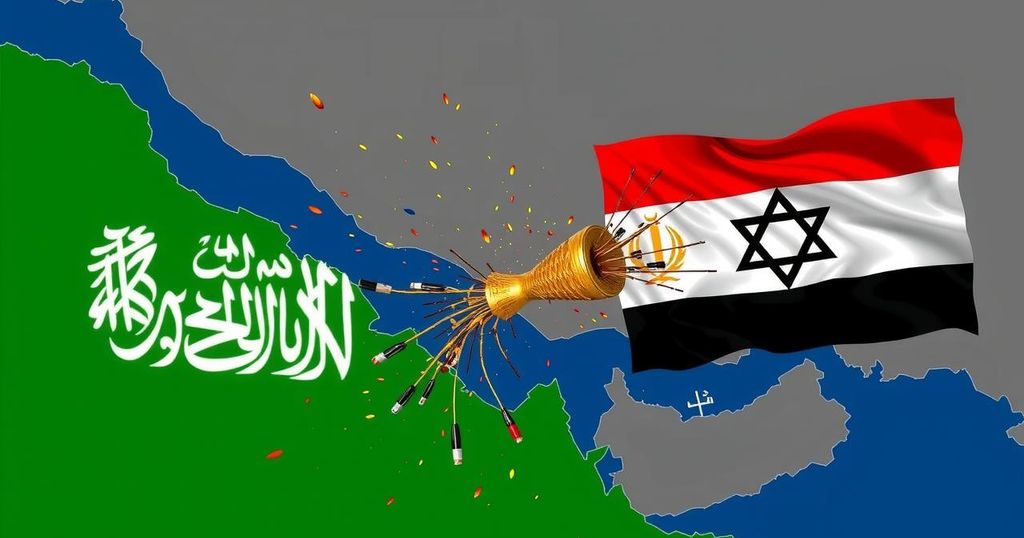Emerging Alliances: The Subtle Support of Saudi Arabia, UAE, and Egypt for Israel Against Iran’s Influence

Recent statements from Saudi Arabia, the UAE, and Egypt following an Israeli military strike on Iran indicate a significant diplomatic shift. Rather than outright condemnation, these countries issued measured responses emphasizing regional stability and security. The UAE and Saudi Arabia highlighted the need for restraint while subtly acknowledging Israel’s strategic position. Egypt’s broader focus on regional security emphasizes a pragmatic approach to diplomacy, indicating a potential realignment of positions in relation to Israel, particularly concerning the shared objective of countering Iranian influence.
In the complex landscape of Middle Eastern alliances, Saudi Arabia, the United Arab Emirates (UAE), and Egypt have exhibited a noteworthy evolution in their responses to Israel’s military actions against Iran. Recent statements from these nations following an Israeli strike on an Iranian base indicate a remarkable shift in tone—leaning towards diplomatic restraint rather than outright condemnation. Each of these countries echoed concerns about sovereignty and the need for regional stability while carefully navigating their historical stances. The UAE’s response was emblematic of this nuanced approach. While it publicly condemned the military action, calling for utmost self-restraint, the language employed was somewhat revealing. By stressing the necessity of dialogue and adherence to international law, the UAE subtly prioritized diplomatic engagement over confrontation, aligning with its recent diplomatic efforts with Israel through the Abraham Accords. This illustrates a recognition of Israel’s strategic posture amidst ongoing security challenges. Similarly, Saudi Arabia’s statement refrained from explicit denunciation. Describing the attack as a violation of sovereignty, it emphasized the importance of security and stability across the region, reflecting a strategic recalibration understood as a careful balance between acknowledging Iran’s sovereignty and an implicit acceptance of Israel’s actions to counter Iranian influence. The tone of Saudi Arabia’s response suggests a desire to maintain a careful equilibrium, allowing for an acknowledgment of shared interests in regional security and stability. Egypt’s reaction extended this diplomatic approach further. By voicing concerns regarding the broader implications of escalating conflict, Egypt’s statement called for a swift ceasefire across multiple fronts. This perspective not only reflects Egypt’s historical role as a mediator in the region but also underscores its pragmatic need to preserve stability along its borders. By shifting the focus from Israel’s actions to overarching regional security, Egypt underscored its commitment to a collective stability that transcends direct confrontations. These measured responses indicate a notable realignment within the region’s diplomatic landscape, suggesting that Saudi Arabia, the UAE, and Egypt are progressively recalibrating their positions regarding Israel. While still acknowledging the Palestinian cause and the need for Muslim unity, their recent pronouncements signal a budding recognition of Israel as a potential partner in addressing shared threats, particularly from Iran. Previously, vocal condemnations of Israeli military actions were the norm among Arab nations. However, today’s restrained responses advocate the emergence of a more complex and conducive relationship among these states and Israel, indicative of shifting priorities towards maintaining peace and stability within the region. This realization represents a crucial step forward in reevaluating alliances traditionally marked by animosity, now evolving toward a landscape characterized by shared strategic interests and collective security strategies.
The article examines the evolving diplomatic responses of Saudi Arabia, the UAE, and Egypt to Israeli military actions against Iran, highlighting a significant shift in regional discourse. Traditionally, Arab nations have condemned Israeli actions, particularly concerning Iran; however, recent statements reflect a more measured approach, where regional security, stability, and the curtailment of Iranian influence take precedence over outright condemnation of Israel. This shift indicates a realignment of interests, suggesting a cautious acknowledgment of Israel’s role in the regional dynamics, particularly in countering Iranian ambitions.
In conclusion, the responses from Saudi Arabia, the UAE, and Egypt towards Israel’s military operations against Iran signal a notable shift away from traditional condemnation towards a more nuanced and measured diplomatic posture. This emerging alignment reflects a broader strategic recalibration aimed at fostering regional stability, where shared concerns over Iranian influence are taking precedence. The evolution in rhetoric suggests a potential pathway towards greater cooperation and understanding among these states and Israel, marking the beginning of a new chapter in Middle Eastern diplomatic relations.
Original Source: www.jpost.com








